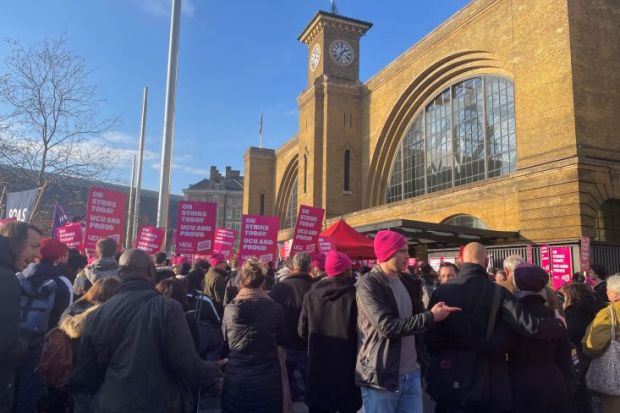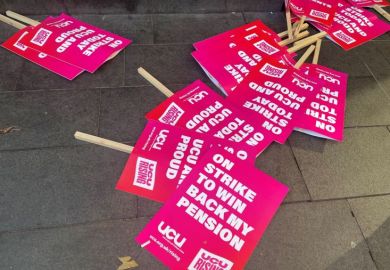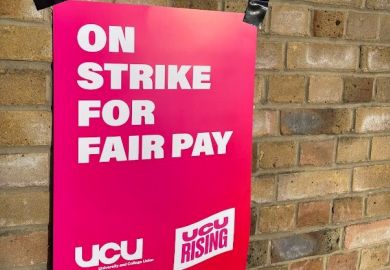Last Friday saw the successful conclusion to the University and College Union’s campaign to reverse the changes to the University’s Superannuation Scheme (USS) pushed through by employers in 2022, a reversal that vice-chancellors had claimed was impossible.
This is the first time a UK union has reversed a pension cut of this magnitude and we have done it at the biggest private pension scheme in the country. It hasn’t been easy. It has taken 69 days of strike action in a five-year battle, but we have defended our pensions. Within months, we will see the full restitution of the scheme and compensation for what has been lost since the cuts were made. It has been a startling success for collective action and the trade union movement, and UCU members should be immensely proud of what they have achieved.
UCU members have forced the reinstatement of the accrual rate to its pre-2022 level, raised the defined-benefit threshold to above its previous level and removed the hard cap of 2.5 per cent on the annual inflationary uplift of that threshold, which failed to effectively protect members’ pensions against inflation. The changes are worth around an additional £15-£17 billion to USS members. An additional £900 million will also be used to help make good the money that members have lost since the cuts came in.
All this has been won by university staff who told us and their employers that they had had enough. Enough not just of pinched pensions, but of deep real-terms pay cuts and the endemic precarious employment practices that have defined the past decade in higher education. The issue of pensions doesn’t stand in isolation from the ongoing struggle to improve our members’ pay and conditions – both are part of the same picture.
As someone who worked as a university lecturer until recently, I know that pensions aren’t a gift from employers. They are our well-earned deferred wages. Cuts to retirement income accompanied by the continuing degradation of pay – an estimated real-terms cut of 30 per cent over the past 14 years – constituted a sustained, two-pronged attack on the incomes of our members.
That is not just bad employment practice, it is counter-productive in terms of the real interests of the sector. The higher education system is that rare thing in the UK: something that actually is world class, not just labelled as such by boosterish politicians. But its value is encapsulated not in shiny new buildings, nor in the strategising of supposedly stellar vice-chancellors but in the knowledge, talent, determination and commitment to education of the people who work within it.
The sector’s financial performance is strong. This year, UK universities had a total income of £44.6 billion, £3.5 billion up on the previous year, the biggest year-on-year increase in at least five years. There is a sector-wide surplus of £2.6 billion, the highest it has been for at least four years. Cash and current investment holdings are at £19.6 billion, £1.3 billion more than last year. But staff expenditure is just 51 per cent of income, a record low. That doesn’t make sense to us or our members, which is why they have supported such a sustained course of industrial action.
The fight does not end here. UCU members have until 31 October to make sure their vote is counted in the pay and conditions postal ballot. Indeed, tens of thousands of our members have already cast their “yes” votes to renew the mandate for industrial action, which has been so successfully proven to work in the USS dispute. This will allow us to continue to fight. It is our chance to win a fair pay rise, roll back casualisation, return workloads to sustainable levels and end pay inequalities. There is so much at stake – we need to force a reset and rebuild our higher education system so that it works for everyone.
We can do this. Our victory in the pension dispute is proof that determined collective action works. We defeated the injustice of imposed pension cuts: we can defeat the injustice of a system that is making our members poorer by exploiting their goodwill and passion for their students. Vice-chancellors told us to stop striking, that we were asking the impossible, but we have proved them wrong. We won’t stop here. Now that we have won back our pensions, we must win on pay, on workloads and on job security.
This past year has shown us that it is only the threat and use of industrial action that can focus the minds of our employers. It has been a hard road that entailed huge sacrifices, yet we moved the employers more than they have ever moved before on pay and conditions, even if it wasn’t far enough. Our members are once again voting yes because they know this is how we win.
This is how we bring employers back to the table to settle this dispute as soon as possible – an objective, I hope, that everybody in higher education can get behind.
Jo Grady is general secretary of the University and College Union.
Register to continue
Why register?
- Registration is free and only takes a moment
- Once registered, you can read 3 articles a month
- Sign up for our newsletter
Subscribe
Or subscribe for unlimited access to:
- Unlimited access to news, views, insights & reviews
- Digital editions
- Digital access to THE’s university and college rankings analysis
Already registered or a current subscriber?







